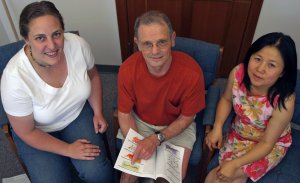 Four University of Oregon faculty members are traveling to China for the first Pacific Rim Summer School in Global Distributed Software Development, which runs for 11 days beginning July 18.
Four University of Oregon faculty members are traveling to China for the first Pacific Rim Summer School in Global Distributed Software Development, which runs for 11 days beginning July 18.
They are joined on the trip by 25 computer science students from the Pacific Northwest – including nine from the UO – and another 25 from around Asia.
The summer school is the result of efforts by Andrzej Proskurowski, Virginia Lo and colleagues in the UO’s department of computer and information science. Proskurowski and Lo are supported by a three-year National Science Foundation grant for their project “CPATHi18n: Internationalization of Computer Science Education – the Pacific Rim Model.”
An overall goal of the project is to better prepare students in computer science for tomorrow’s workforce. It is hoped, Lo said, that collaboration will help in the design of new computer science curricula with internationally-minded elements such as globally distributed software development, cross-cultural communication for software teams and international computer ethics. Their efforts will lead to educational recommendations to the Association for Computing Machinery (ACM) and the Institute of Electrical and Electronics Engineers (IEEE).
“Computer science education in the U.S. is based on curriculum standards set by our professional organizations the ACM and the IEEE,” Lo said. “The current standards and computer science education for decades have been very U.S.-centric and do not embody the current global nature of the way computers are used, the problems being addressed and the global operation of today’s computer industry. We want to include the academic training and experiences that prepare our computer science graduates for working in today’s global environment.”
The UO’s commitment has grown, she said, by working closely with four industry partners: Microsoft, Intel, Google and IBM.
“We chose Asia as our target partnership, with emphasis on China, because of the ties UO and our faculty in computer and information science have with the Pacific Rim,” Lo said. “We are fortunate to be partnering with the very top schools in China, Korea and Japan.
This summer school is being held at Peking University in Beijing. Participating UO faculty are Proskurowski, Lo, Art Farley and Stuart Faulk. Teaching efforts will be shared with faculty from Peking University, Tsinghua University, Beihang University and industry partners Intel, Avaya Research and Microsoft.
Participating UO students can earn up to six credits in computer science through the Study Abroad Program. UO students taking part are undergraduates Stephen Auker, Nicholas Chaimov, Trevor Dilley, Andrew McCornack and Kevin Trinh, and graduate students Megan Brittell, Clayton Coleman and Linda Sato.
The road to this summer’s China trip began with ideas developed in workshops organized by the CPATHi18n program.
In November 2007, the first planning workshop was held in Portland to meet with academic and industry partners in the Pacific Northwest. Next was a “friendship trip” to China and Japan in March 2008 to visit with officials at Peking, Tsinghua, Beihang and Tohoku universities, as well as IBM China and Microsoft Research Asia. “During this trip we found that the issues facing us and our students are very similar to those facing our Asian partners,” Proskurowski said.
“We all have grown together. Our experiences involve learning more about Asian cultures through study and personal experience,” he continued. “We are involving our students in the internationalization activities, through these Pacific Rim Summer Schools. We have also worked with our North American and Asian partners in the development of publications, educational activities and course materials.”
Under the NSF grant, the group has conducted formal workshops in Portland (May 2008 and May 2009) and Beijing (October 2009).
The first Pacific Rim Summer School was at the UO in July 2009 as part of a training session organized and designed by the UO’s Network Startup Resource Center. It drew an international group of students that included network engineers and operators from Africa and South Asia, as well as undergraduate computer science majors from China and the UO. The students attended lectures and took part in team-based lab exercises involving the principles and practical skills needed to deploy a campus-wide computing network.
More recently, CPATHi18n was visible in March at the 2010 ACM Special Interest Group on Computer Science Education conference in Milwaukee, Wis. Project representatives discussed computer science education and collaborative opportunities in China, and they presented two papers. One covered the process of building a global community of computer science educators; the other focused on current status of professional computing education for undergraduate majors and fundamental computer education for non-majors in China.
A by-product of curriculum innovation in soft skill areas such as cross-cultural communication and international computer ethics has lead the project’s management team to work with the UO School of Law on intellectual property law in China, the Lundquist College of Business on cross-cultural communication, team-building and leadership and with Asian Languages, the Confucius Institute and the Oregon K-20 China Flagship Language Program.
“We plan to establish a self-sustaining, international Pacific Rim Summer School program,” Proskurowski said. “To date, we have built and now maintain a strong community of computer science departments from Asia and North America, and with that we continue to strengthen our collaboration with the global high-tech industry.”